A suicide bomber attacked an education centre in the Afghan capital on Friday where hundreds of students were preparing for university exams, killing at least 20 people, most of them young women.
The bombing happened in the Dasht-e-Barchi neighbourhood of western Kabul, a predominantly Shiite Muslim area home to the minority Hazara community, the target of some of Afghanistan's most deadly attacks.
The bomber shot dead two security guards before entering the gender-segregated classroom, student Ali Irfani, who escaped the carnage, told AFP.
"Not many boys were hit because they were at the rear end of the classroom. The bomber entered from the front door where girls were sitting," he said.
Akbar, another student witness, also told AFP that young women made up most of the casualties, with up to 600 people in the hall at the time.
No group has yet claimed responsibility for the blast at Kaaj Higher Educational Centre, which coaches students for university admission tests.
However, the jihadist IS group has claimed previous attacks in the area targeting girls, schools and mosques.
A resident who ferried victims to hospitals said he saw body parts scattered across the floor of the hall.
"Many students were hit by shrapnel in their head, neck and eyes," said Asadullah Jahangir.
Kabul police spokesman Khalid Zadran said 20 people were killed and 27 others wounded.
The United Nations Assistance Mission in Afghanistan (UNAMA) told AFP that at least 24 people were killed and 36 others wounded in the attack, adding the numbers were expected to rise.
A shopkeeper from the neighbourhood said there was a loud explosion and then crowds of students rushed out of the centre.
"It was chaos as many students, boys and girls, tried to escape from the building. It was a horrific scene. Everyone was so scared," he told AFP, requesting anonymity.
Italian NGO Emergency, which operates a hospital in Kabul, said it had received 22 patients, including 20 women, two of whom had died.
"The victims are all between 18 and 25 years old, and most of them were in the classroom to take an exam," it said in a statement.
Scenes of chaos as families rush to find victims
Families rushed to area hospitals where ambulances arrived with victims, and lists of those confirmed dead and wounded were posted on the walls.
"We didn't find her here," a distressed woman looking for her sister at one of the hospitals told AFP. "She was 19 years old."
"We are calling her but she's not responding."

Security forces stand guard after a suicide bomb attack on an education institute has killed 19 people and wounded many more in Kabul, Afghanistan on 30, September, 2022. Source: Getty / Anadolu Agency/Anadolu Agency
By Friday afternoon, the Taliban allowed journalists to visit the educational centre.
The roof of the hall where students had gathered for a test had completely collapsed, while its doors and windows were blown out, an AFP correspondent reported.
A frequently attacked neighbourhood
The Taliban's return to power in Afghanistan last year brought an end to the two-decade war and a significant reduction in violence, but security has begun to deteriorate in recent months.
Afghanistan's Shiite Hazaras have faced persecution for decades, with the Taliban accused of abuses against the group when they first ruled from 1996 to 2001.
Such accusations picked up again after they swept back to power.
Hazaras are also the frequent target of attacks by the Taliban's enemy, the self-proclaimed Islamic State (IS) armed group. Both consider them heretics.
Many attacks have devastated the Dasht-e-Barchi neighbourhood, with several targeting women, children and schools.
Last year, before the Taliban returned to power, at least 85 people - mainly girl students - were killed and about 300 wounded when three bombs exploded near their school in the area.
No group claimed responsibility, but a year earlier, IS claimed a suicide attack on an educational centre in the same neighbourhood that killed 24, including students.
In May 2020, the group was blamed for a bloody gun attack on a maternity ward of a hospital in Dasht-e-Barchi that killed 25 people, including new mothers.
And in April this year, two deadly bomb blasts at separate education centres in the area killed six people and wounded at least 20 others.
Education is a flashpoint issue in Afghanistan, with the Taliban blocking many girls from returning to secondary education. IS also stands against the education of women and girls.











